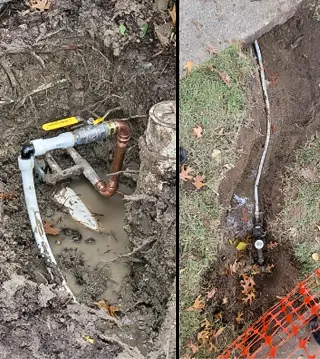Water Main Repair & Replacement Services

When it comes to residential plumbing, your main water line is one of the most important and often overlooked parts of your system. It’s the lifeline that brings fresh water into your home, and even small problems can cause big headaches, like rising water bills, pressure drops, or soggy spots in the yard.
At GPS Plumbing, we specialize in finding and fixing water main issues the right way. Also known as the yard service line, this is the pipe that connects your home to the city’s water supply.
Whether it’s a leak, corrosion, or damage from shifting soil, our licensed team provides clear answers, honest recommendations, and flat-rate pricing, so you’re never left guessing.
Water Main Leak Detection & Diagnosis
We don’t rely on pressure tests—instead, we use real-world plumbing knowledge and proven methods. One of the first things we do is check the water meter with the whole house shut off. If the dial is still moving, you’ve got a leak somewhere between the meter and the house. From there, we use our experience and a few “tricks of the trade” to locate and confirm the issue.
- Spot Repairs (When Possible): If the damage is isolated and your existing line is otherwise in good shape, we’ll go over options for a targeted repair instead of full replacement.
- Full Water Main Replacement: When the line is beyond repair, we offer full water main replacement using high-quality materials like copper, PEX, or PVC. We also encounter older galvanized lines, which may need to be upgraded for flow and safety. We’ll review the best solution based on your home’s layout and soil conditions.
- Clean, Safe Entry into the Home: Whether it’s copper, PEX, PVC, or galvanized piping, we ensure the new water main ties into your home securely and meets all code requirements. We often find galvanized pipe at the house entry, which is outdated and prone to failure.
Signs You Might Have a Water Main Issue
- Sudden drop in water pressure throughout the home
- Unexplained increase in your water bill
- Wet or soggy spots in the yard, especially near the meter or driveway
- Running water sounds when all fixtures are off
- Discolored water from multiple taps
Water main issues can develop from ground shifting, corrosion, root intrusion, or aging pipe materials. We’ll get to the bottom of it—fast.


